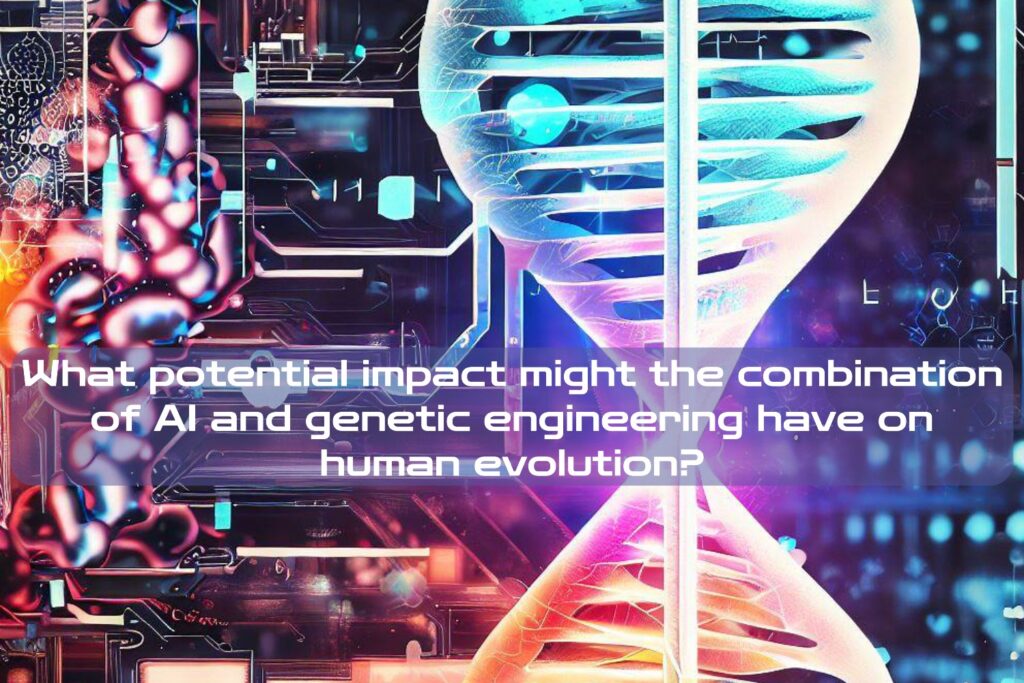The Intersection of AI and Genetic Engineering
In recent years, two areas of science and technology have made major strides in their development: artificial intelligence (AI) and genetic engineering. While they may seem unrelated at first, these fields are actually intersecting in ways that could have a profound impact on human evolution.
At its core, AI involves the creation of machines or software that can perform a wide variety of tasks without direct human input. This technology has already been applied to many areas of life, from speech recognition to self-driving cars.
Meanwhile, genetic engineering has given us the ability to edit the DNA of organisms – including humans – with greater precision than ever before.
The convergence of AI and genetic engineering could lead to groundbreaking advancements in medicine, agriculture, and many other fields. However, it also raises important questions about what it means to be human – particularly when we start editing our own DNA or creating machines that can outperform us in various ways.
The Importance of Discussing Human Evolution

Given the potential implications for humanity as a whole, it’s important to discuss what might happen if these two fields continue to merge. For one thing, we need to consider how these advancements could influence our understanding of evolution itself.
Since its inception as a scientific theory, evolution has been based on the idea that natural selection is responsible for shaping living organisms over time. However, if we start consciously manipulating our own genes or creating machines that can outthink us at every turn, does this mean that natural selection will no longer be the driving force behind human development?
And if so, what does that mean for our future as a species?
Another important reason to discuss this topic is simply because there are so many unknowns at this point.
While we have some idea of what might be possible, we don’t really know what the implications of these technologies will be until we start using them more widely. In order to make informed decisions about how to proceed, it’s essential that we engage in open and honest discussions about the potential impact on human evolution.
The Basics of AI and Genetic Engineering
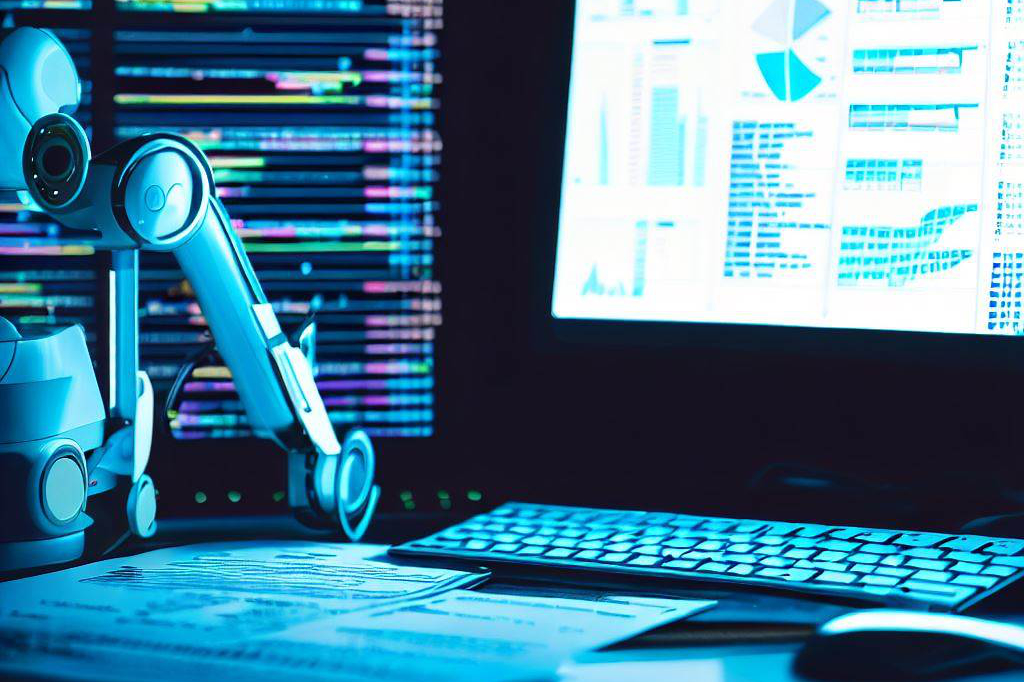
Artificial intelligence, also known as AI, refers to the development of computer systems that can perform tasks that would normally require human intelligence, such as learning, problem-solving, and decision-making. On the other hand, genetic engineering involves modifying or manipulating an organism’s genetic material in order to alter its characteristics. This technology has been used for years in agriculture and medicine.
When both AI and genetic engineering are combined, they open up new possibilities for humans to change not only their environment but also their own biology. By combining the two technologies, scientists can create intelligent systems that can learn from experience and make decisions based on data analysis.
This could be useful in predicting genetic diseases or creating personalized medical treatments. Genetic engineering by itself is already quite powerful since it allows us to modify DNA sequences in plants or animals.
By using CRISPR gene-editing technology, scientists can now edit genes with greater accuracy than ever before. With the help of AI algorithms and machine learning, we could speed up this process even more by analyzing large amounts of data and identifying patterns that could lead to new discoveries.
Positive impacts on human evolution
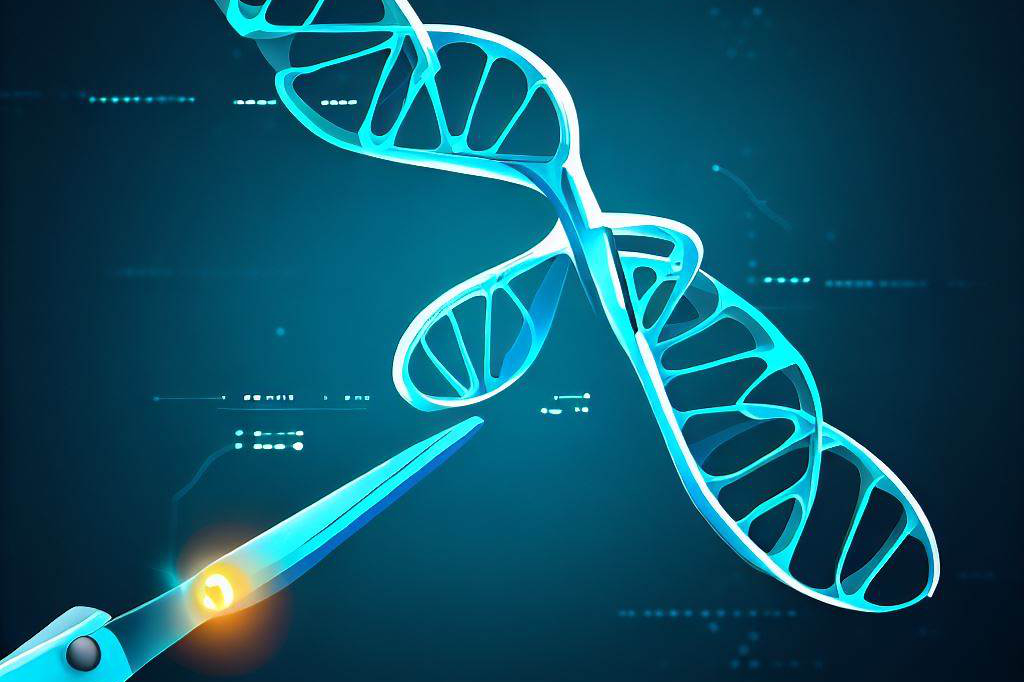
Increased lifespan and health: A Future of longevity
One of the most promising outcomes of combining AI and genetic engineering is an increase in human lifespan and health. With gene editing, humans could potentially remove harmful mutations that lead to genetic diseases such as Alzheimer’s, cancer, or Huntington’s disease. In addition to this, AI can be used for precision medicine to target specific ailments in individuals.
The possibilities are endless when it comes to increasing lifespans and overall health. Imagine a world where people live for centuries without experiencing degenerative illnesses.
By using AI algorithms to analyze data about individuals’ genetic makeups and medical histories, doctors could tailor treatments specifically suited to each person’s unique physiology. Genetic engineering could even be used to repair damage from aging itself – effectively extending the life expectancy of humans.
Improved cognitive abilities: The Next Step in Evolution?
Another positive impact of combining AI and genetic engineering is the potential for improved cognitive abilities in humans. With gene editing, scientists might be able to create more intelligent humans by combining certain traits found in various people or animals – such as problem-solving skills from dolphins or memory enhancement from elephants.
Furthermore, with the development of machine learning algorithms that can emulate human cognition, we may eventually see artificial intelligence that can augment our own cognitive abilities or even merge with our brains altogether – creating a new breed of “superhumans.”
The implications of this type of advancement are fascinating – imagine what humanity could achieve if we were all capable of thinking like geniuses!
Enhanced physical abilities: A New Age of Athletics
The third potential benefit from combining AI and genetic engineering would be enhanced physical abilities in humans. Imagine a world where athletes are not limited by their natural talent or genetics but are instead designed specifically for their sport through advanced gene editing techniques.
With CRISPR technology, scientists could create stronger, faster, and more agile humans – effectively leveling the playing field in sports and creating a new era of athleticism. Additionally, gene editing could be used to treat physical injuries or even prevent them from happening altogether.
Overall, the potential positive impacts of combining AI and genetic engineering on human evolution are immense. From extending lifespan to increasing cognitive abilities and enhancing physical capabilities – this technology can bring about a new era of humanity that we have only just begun to imagine.
Negative impacts on human evolution
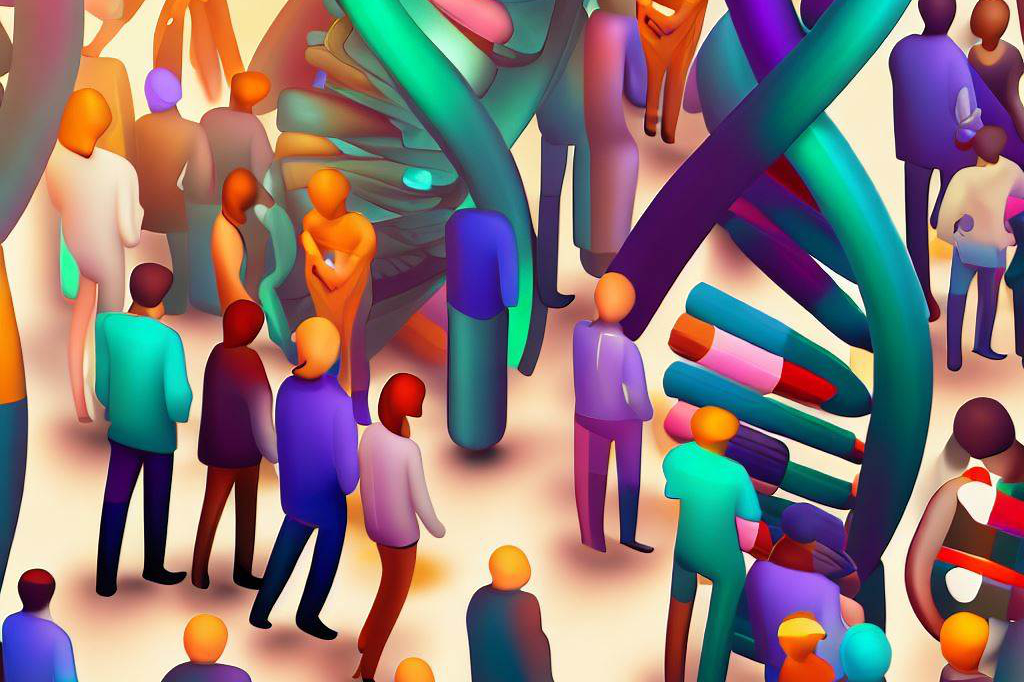
Widening gap between the rich and poor
One potential negative impact of combining AI and genetic engineering is the widening gap between the rich and poor. The wealthy will have access to these technologies first, which will give them even more advantages over those who cannot afford it.
This could lead to a society where the rich get richer and the poor get left behind. Additionally, if AI is used to automate jobs that are typically done by low-income workers, it could exacerbate income inequality.
Ethical concerns about gene editing in humans

Another concern with combining AI and genetic engineering is ethical concerns about gene editing in humans. While gene editing has shown promise in treating certain diseases, there are many ethical considerations that come with manipulating human DNA.
For example, some people worry that gene editing could lead to designer babies, where parents can choose traits for their children like eye color or intelligence. This raises questions about what kind of world we want to live in and how far we should go to improve ourselves.
Unintended consequences
There is always the possibility of unintended consequences when new technologies are introduced. For example, it’s possible that genetic engineering could have unforeseen effects on our environment or our health. Additionally, as we rely more heavily on AI for decision making processes, there’s a risk that these systems might make biased or incorrect judgments that can negatively impact society as a whole.
While combining AI and genetic engineering has the potential to bring many benefits to humanity, such as increased lifespan and improved cognitive abilities; but it also comes with a number of potential pitfalls, including widening income inequality between rich and poor due to unequal access to these technologies; ethical concerns around gene editing in humans; and unintended consequences from using new technology without fully understanding its long-term effects on individuals or society. It’s important to consider these potential negative impacts before we fully embrace these technologies.
Potential consequences for society

Changes in the job market due to automation
The combination of AI and genetic engineering could lead to significant changes in the job market. With AI becoming more advanced, many jobs that were previously done by humans may become automated.
This means that people who work in these fields may find themselves out of a job. For example, self-driving cars could make taxi and truck drivers redundant.
However, it is also possible that this automation will create new jobs and industries. For instance, there will be a need for people who can design and maintain the machines that carry out these tasks.
This shift towards automation could also lead to changes in education and training programs. It may become necessary to train people for jobs that did not exist before or retrain those whose jobs have been made redundant.
New social norms surrounding gene editing
The ability to edit genes raises important ethical questions about what is considered acceptable when it comes to altering human biology. Gene editing could potentially eliminate genetic diseases or predispositions, but it also opens up the possibility of creating “designer babies”. These are babies whose genes have been edited so they possess desirable traits such as intelligence or physical appearance.
This raises questions about whether a person’s genetic makeup should be seen as something that can be modified like any other feature on their body. If gene editing becomes widely accepted, we may see new social norms emerge surrounding what is considered normal or desirable in terms of genetics.
It is likely that debates over the ethics of gene editing will continue as scientists progress with this technology. In addition, there may be a divide between those who can afford gene editing treatments and those who cannot, leading to further societal divisions.
Final Thoughts
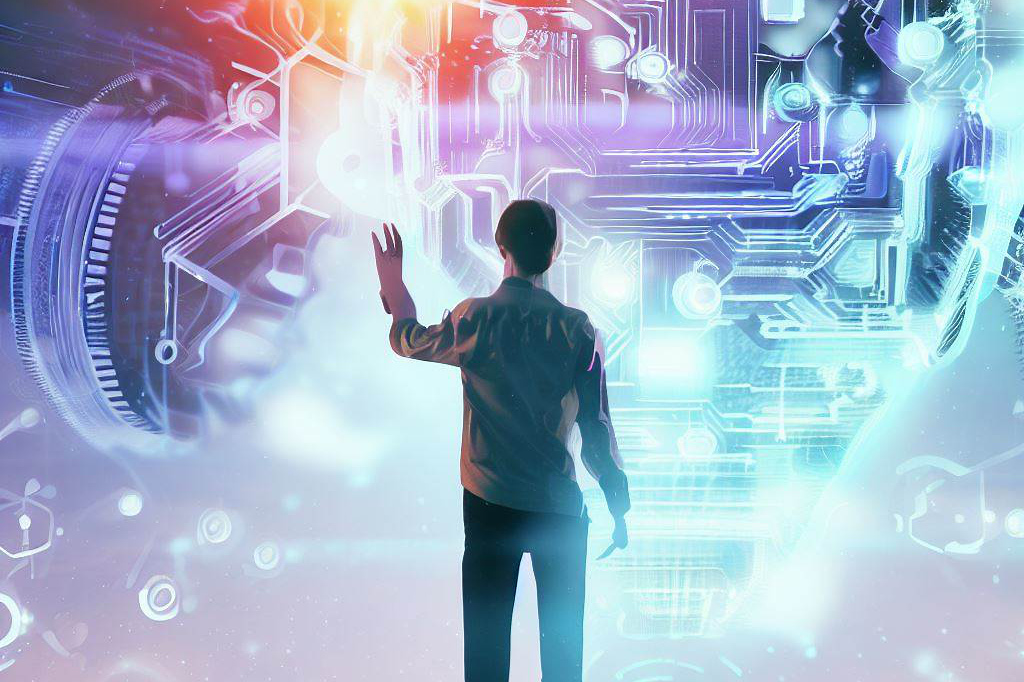
The potential impact of combining AI and genetic engineering on human evolution is immense. While there are many positive benefits to this technology, such as an increased lifespan and improved cognitive abilities, there are also negative consequences that must be considered.
The gap between the rich and poor could widen even further due to the high cost of these technologies, and there are many ethical concerns surrounding gene editing in humans. Despite these concerns, we cannot ignore the possibilities that combining AI and genetic engineering could bring.
The increased potential for improved health and physical abilities could have a significant impact on humanity as a whole. However, it is important that we proceed with caution in order to ensure that the technology is used ethically.
In addition to this, we must also consider the potential consequences for society as a whole. The job market could change drastically due to automation, and new social norms surrounding gene editing could emerge.
It is important that we stay informed about these developments in order to ensure that they are used for the benefit of all. It is clear that combining AI and genetic engineering has both positive and negative potential impacts on human evolution.
It is up to us as a society to carefully consider these possibilities in order to make informed decisions about how we move forward with this technology. With careful consideration, we can work towards a future where technology benefits all individuals equally.
FAQ: Potential Impact of AI and Genetic Engineering on Human Evolution
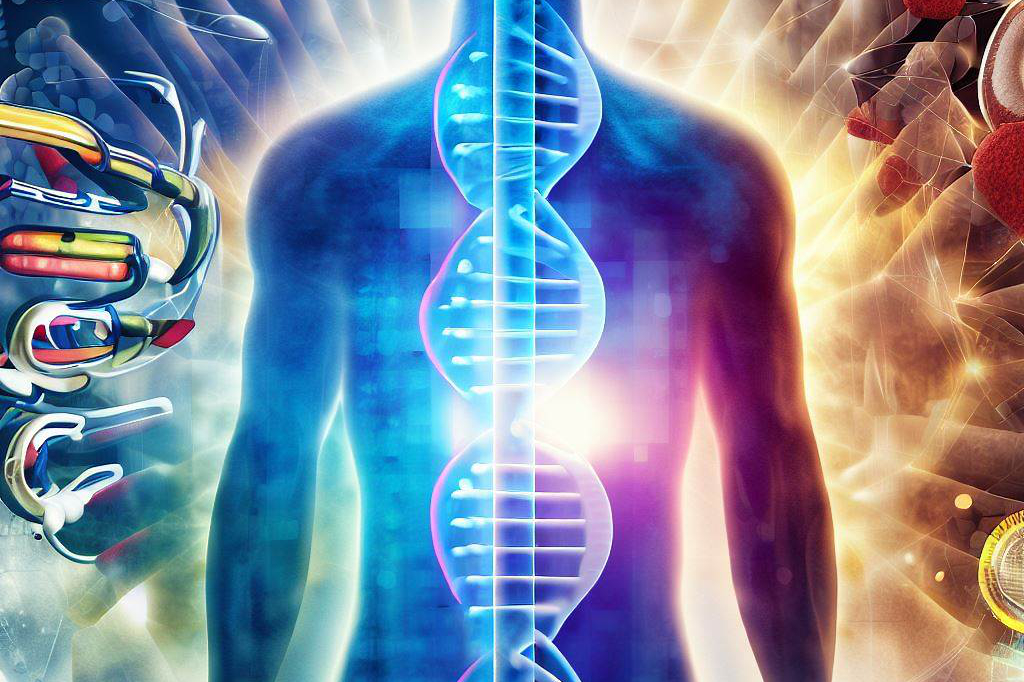
1. Q: What is the potential impact of combining AI and genetic engineering on human evolution?
A: The combination of AI and genetic engineering has the potential to significantly influence human evolution by enhancing our understanding of genetics, improving medical treatments, and shaping the future of human traits.
2. Q: How can AI contribute to human evolution through genetic engineering?
A: AI can aid in analyzing vast amounts of genetic data, identifying patterns, and predicting outcomes. This knowledge can help genetic engineers develop targeted interventions to modify genes and potentially eradicate genetic diseases or enhance desirable traits.
3. Q: What are some potential benefits of AI-assisted genetic engineering in terms of human evolution?
A: AI-assisted genetic engineering can lead to advancements such as personalized medicine, the prevention of hereditary diseases, increased life expectancy, improved cognitive abilities, and even the potential to explore new frontiers of human capabilities.
4. Q: Are there any ethical concerns surrounding the combination of AI and genetic engineering?
A: Yes, ethical concerns do arise when AI and genetic engineering intersect. Issues such as consent, privacy, equity, and unintended consequences need to be carefully addressed to ensure responsible and equitable use of these technologies.
5. Q: Can AI and genetic engineering alter human intelligence and cognitive abilities?
A: The combination of AI and genetic engineering has the potential to enhance human intelligence and cognitive abilities. By understanding the genetic components that influence intelligence, researchers can explore ways to optimize cognitive functions and potentially improve overall human intellectual capabilities.
6. Q: How might AI and genetic engineering impact the prevalence of genetic diseases?
A: AI can assist in identifying genetic markers associated with various diseases, enabling early detection and personalized treatments. Genetic engineering techniques, such as gene editing, may offer the potential to correct or eliminate disease-causing genetic mutations, leading to reduced prevalence of genetic disorders.
7. Q: Will AI and genetic engineering lead to designer babies?
A: The concept of designer babies, where specific genetic traits are intentionally selected or modified, raises ethical concerns and is a topic of debate. While AI and genetic engineering offer the potential for such interventions, societal, ethical, and legal frameworks will determine the extent to which these practices are allowed.
8. Q: Can AI and genetic engineering impact the diversity of the human gene pool?
A: The combination of AI and genetic engineering has the potential to affect the diversity of the human gene pool. Interventions aimed at eliminating certain genetic traits or enhancing others could influence the genetic diversity within populations. Careful consideration of the consequences is necessary to ensure the preservation of genetic diversity.
9. Q: What role does AI play in analyzing the vast amount of genetic data?
A: AI plays a crucial role in analyzing large-scale genomic data by utilizing machine learning algorithms and pattern recognition techniques. It can efficiently identify genetic variations, associations with diseases, and predict genetic outcomes, leading to deeper insights and more targeted interventions.
10. Q: Are there any limitations or challenges in combining AI and genetic engineering for human evolution?
A: Yes, there are challenges and limitations. These include ethical considerations, regulatory frameworks, potential unintended consequences, and the need for comprehensive understanding of genetic complexities. Additionally, the long-term effects and societal impact of genetic modifications should be thoroughly studied and evaluated.
TL;DR…
– 🧬 The combination of AI and genetic engineering can have significant impacts on human evolution.
– 🌱 Positive impacts include increased lifespan and health, improved cognitive abilities, and enhanced physical abilities.
– ⚖️ Negative impacts may include a widening gap between the rich and poor, ethical concerns about gene editing, unintended consequences, changes in the job market, and new social norms.
– 🌍 The potential consequences of AI and genetic engineering on society should be carefully considered.
– 💡 Further discussions and research on the topic of human evolution and the intersection of AI and genetic engineering are important.

C M, a seasoned editor, journalist, and consultant, is deeply fascinated by the convergence of technology, space, and the future of humanity.
With a particular interest in transhumanism, futurology, and the philosophical and ethical dimensions of these domains, C M serves as the lead contributor to TranscendSphere and SpaceSpotlight.
When not penning insightful articles on these rapidly evolving fields, C M indulges in their love for podcasts and books, proudly embracing their status as a ‘Happy Nerd Extraordinaire!’

